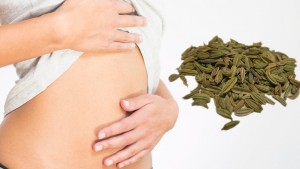By Sayer Ji
Contributing Writer for Wake Up World
Painful periods (primary dysmenorrhea) afflict approximately 25% of all women, with estimates for adolescents reaching as high as 90%.[i] Given the prevalence of this disabling condition, and that treatment usually involves NSAID drugs and sometimes oral contraceptives – both of which have serious, even life-threatening side effects – natural alternatives are desperately needed. So what better place to look than your spice rack, which an under reported body of clinical research indicates may offer solutions at least as effective as drugs.
There are no less than three clinical studies in the medical literature comparing fennel to the NSAID drug mefenamic acid for the treatment of painful periods in women.
The first, which occurred in 2002, randomized two groups of 55 high-school girls (mean age 13) to receive either fennel seed extract or mefenamic acid for 2 months. The remarkable results showing the superiority of fennel were reported as follows:
“In the fennel group, 80% of girls and in the mefenamic acid group, 73% of girls showed complete pain relief or pain decrease, while 80% in the fennel group and 62% in the mefenamic acid group no longer needed to rest. There was no significant difference between the 2 groups in the level of pain relief.”
The next study, published in 2003, took 60 girls (mean age 12.5) with primary dysmenorrhea, administering either either 25 drops of 2% essence of fennel seed extract (taken every 4 hours) or 250 mg (taken every 6 hours) of mefenamic acid over the course of their menstrual cycle.
They reported their results as follows:
The essence of fennel can be used as a safe and effective herbal drug for primary dysmenorrhea, however, it may have a lower potency than mefenamic acid in the dosages used for this study.” [Note: “No complication was reported in mefenamic acid treated cycles, but five cases (16.6%) withdrew from the study due to fennel’s odor and one case (3.11%) reported a mild increase in the amount of her menstrual flow.
A third study, published this year in the Iranian Journal of Nursery and Midwifery, which as an open access article can be read in its entirety here, describes the results of a randomized parallel-group clinical trial, comparing the effects of 2% fennel extract drops to mefenamic acid (cap 250 mg) in the management of primary dysmenorrhea in 60 18-25 year olds.
The results of the study were reported as follows:
The present study showed that the efficacy of fennel drop 2% in pain relief in primary dysmenorrhea is comparable to the efficacy of common NSAIDs such as mefenamic acid cap. Investigators recommend that another product of fennel such as tab, cap, or fennel oil might be more acceptable than the essence. One subject had severe menstruation after taking fennel drop.
It should be emphasized that many herbs, and especially their seeds, are very powerful and should be treated with great respect, consideration and care. Because fennel is antispasmodic and causes muscular relaxation, it can significantly increase the risk of menstrual bleeding. Anyone with a history of excessive bleeding would need to be especially cautious, and certainly, anyone wishing to dabble in herbalism would be well advised to seek the guidance of a licensed medical herbalist and/or integrative medical practitioner.
For additional research on the potential health benefits of fennel, view our Fennel Research page. For additional research on painful periods, view our Dysmenorrhea Research page.
Article Resources
[i] eMedicine > Dysmenorrhea By Andre Holder, Laurel D Edmundson and Mert Erogul. Updated: Dec 31, 2009
Further articles by Sayer Ji:
- Eating Sesame Seeds Superior To Tylenol for Knee Arthritis
- The Grain That Damages The Human Brain
- Honey Plus Coffee Beats Steroid For Treating Cough
- The Cancer-Causing Metal Millions Eat, Wear or Have Injected Into Their Kids
- Turmeric Superior to Chemical Mouthwash In Improving Oral Health
- Biophotons: The Human Body Emits, Communicates with, and is Made from Light
-
The 2013 Measles Outbreak: A Failing Vaccine, Not A Failure To Vaccinate
- 3 Evidence-Based Ways To Reverse Skin Aging Naturally
-
Why Is The Food Industry Poisoning Us With Trillions of Nanoparticles?
- How to Clean Your Arteries With One Simple Fruit
- 13 Evidence-Based Medicinal Properties of Coconut Oil
About the author:
 Sayer Ji is the founder and director of www.GreenMedInfo.com and an advisory board member at the National Health Federation, an international non-profit, consumer education, health-freedom organization.
Sayer Ji is the founder and director of www.GreenMedInfo.com and an advisory board member at the National Health Federation, an international non-profit, consumer education, health-freedom organization.
He co-authored the book Cancer Killers: The Cause Is The Cure, and is currently co-authoring another book with Tania Melkonian entitled EATomology: An Edible Philosophy of Food.
Check out Sayer Ji’s new collaborative project EATomology.com.

If you've ever found value in our articles, we'd greatly appreciate your support by purchasing Mindful Meditation Techniques for Kids - A Practical Guide for Adults to Empower Kids with the Gift of Inner Peace and Resilience for Life.
In the spirit of mindfulness, we encourage you to choose the paperback version. Delve into its pages away from screen glare and notifications, allowing yourself to fully immerse in the transformative practices within. The physical book enriches the learning process and serves as a tangible commitment to mindfulness, easily shared among family and friends.
Over the past few years, Wake Up World has faced significant online censorship, impacting our financial ability to stay online. Instead of soliciting donations, we're exploring win-win solutions with our readers to remain financially viable. Moving into book publishing, we hope to secure ongoing funds to continue our mission. With over 8,500 articles published in the past 13 years, we are committed to keeping our content free and accessible to everyone, without resorting to a paywall.







